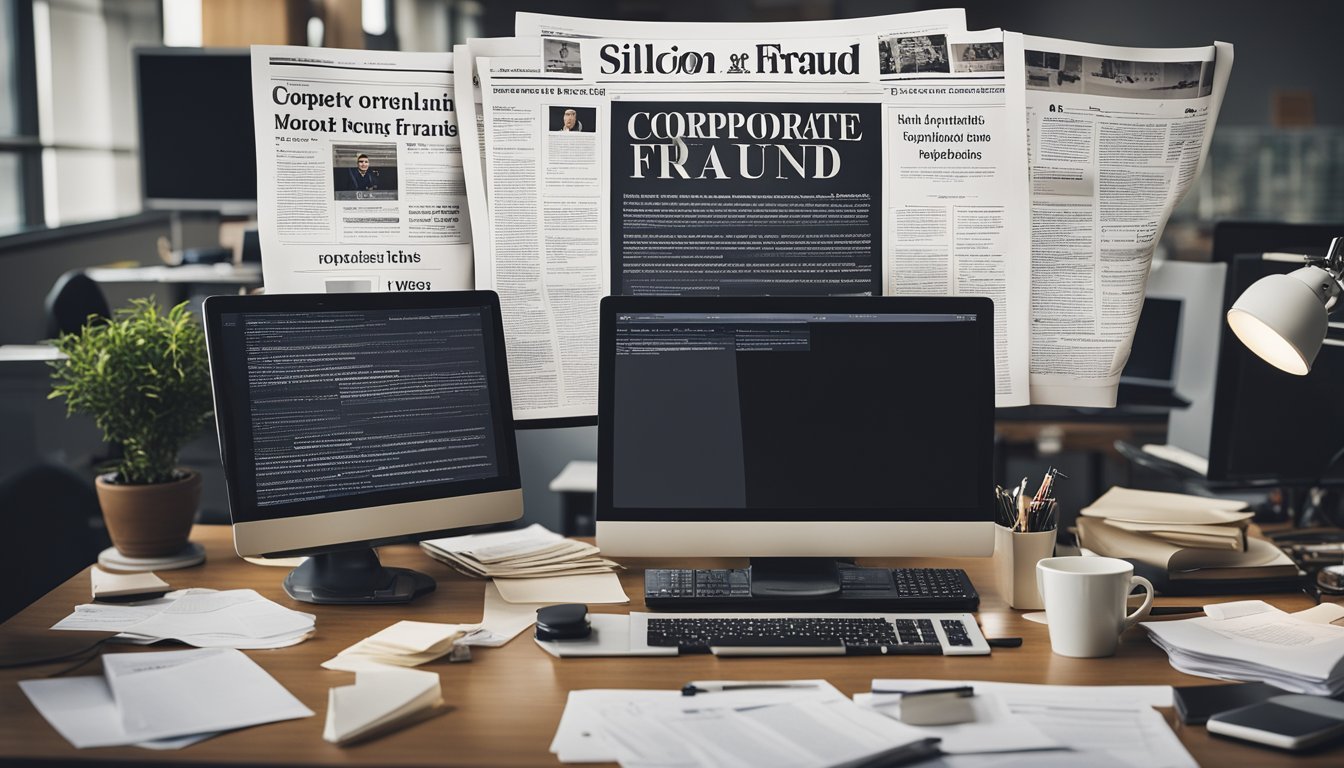Top 7 Documentaries About Corporate Fraud in Silicon Valley
Must-Watch Exposés
Corporate fraud in Silicon Valley has captured the fascination of audiences worldwide, shining a light on the darker side of innovation and entrepreneurship. Documentaries on this topic dissect the complex web of deception woven by some of the most renowned tech companies and their leaders. These films provide a rare glimpse into how ambition and unethical behavior can blur the lines between success and scandal.
For those intrigued by tales of deception and the inner workings of tech giants, these documentaries offer both cautionary tales and riveting storytelling. With expertly crafted narratives and in-depth investigations, viewers are taken on a journey through some of the most notorious and impactful fraud cases in Silicon Valley's history.
1) The Inventor: Out for Blood in Silicon Valley (2019)
This compelling documentary, directed by Alex Gibney, explores the rise and fall of Theranos, a health technology company founded by Elizabeth Holmes. With ambitions to revolutionize blood testing, Holmes touted her technology as capable of running myriad tests with just a tiny blood sample.
Theranos reached a peak valuation of $9 billion, catapulting Holmes to fame as the youngest self-made female billionaire. Her narrative drew comparisons to tech luminaries like Steve Jobs.
However, whistleblowers and investigative journalists uncovered significant flaws and falsifications in Theranos' technology. Once heralded as a breakthrough in medical innovation, the company crumbled under the weight of deception and fraud.
The film premiered at the Sundance Film Festival in 2019 and serves as a cautionary tale about ambition unchecked by ethics in Silicon Valley.
2) Enron: The Smartest Guys in the Room (2005)
Released in 2005, "Enron: The Smartest Guys in the Room" explores the rise and fall of Enron Corporation. Directed by Alex Gibney, this documentary is based on the best-selling 2003 book by Fortune reporters Bethany McLean and Peter Elkind.
The film takes a detailed look at the corporate scandal that led to the company's bankruptcy in 2001. It shows how Enron executives engaged in fraudulent business practices, resulting in devastating financial loss for employees and investors.
Key figures like Enron's founder Ken Lay, and CEO Jeff Skilling, are examined, revealing their roles in the company's illegal operations. The documentary highlights the complexities of the financial schemes used and the shockwaves the scandal sent through the corporate world.
"Enron: The Smartest Guys in the Room" uncovers the methods by which Enron misled stakeholders and manipulated market information. By employing interviews, internal documents, and media footage, it paints a vivid picture of corporate greed.
For those interested in a deep dive into corporate fraud and ethics, this film offers a compelling watch. More information.
3) Betting on Zero (2016)
"Betting on Zero" is a gripping documentary directed by Ted Braun. The film investigates the alleged unethical business practices of Herbalife, a global nutrition company.
The narrative primarily follows hedge fund manager Bill Ackman. He leads a public campaign to prove that Herbalife operates as a pyramid scheme. Ackman's insights and strategies form the backbone of the documentary.
Experts offer their viewpoints throughout the film. Figures like Bill Keep, a critic of multi-level marketing schemes, provide valuable context. Their perspectives help illuminate the controversial aspects of Herbalife's business operations.
"Betting on Zero" blends personal stories with in-depth analysis. The documentary not only critiques Herbalife but also explores the broader impact of similar business models. It’s an essential watch for those interested in corporate ethics and fraud.
For more details, check the film's Wikipedia page.
4) Fyre: The Greatest Party That Never Happened (2019)
Chris Smith's documentary, "Fyre: The Greatest Party That Never Happened," spotlights the disastrous Fyre Festival, marketed as a luxury music festival in the Bahamas.
The film showcases the festival's promotional campaign, which featured top models and influencers. These promotions created unrealistic expectations among ticket buyers.
As the festival approached, it became evident that the organizers were overwhelmed. Attendees faced dire conditions, including inadequate housing and food.
The documentary highlights the behind-the-scenes chaos and poor planning. It serves as a cautionary tale about the perils of deceptive marketing in the digital age.
For more information, visit the IMDb page.
5) The China Hustle (2017)
"The China Hustle" dives into a massive securities fraud that involved Chinese companies listed on the US stock market. Directed by Jed Rothstein and produced by Magnolia Pictures, this documentary uncovers the fraudulent practices proliferated by these companies.
Activist shareholders and due diligence professionals, including Dan David and Jon Carnes, play key roles in exposing these scams. They reveal how various Chinese companies falsified financial records to appear more profitable and secure investments.
Set against the backdrop of post-2008 financial crisis recovery, the film illustrates the lack of regulatory oversight and the desperate search for growth, which led many investors astray. The documentary provides a compelling look at the mechanisms and individuals behind this complex fraud.
Watch "The China Hustle" to understand how widespread and systemic such financial deception can be. This film is a crucial resource for anyone interested in the mechanics of corporate fraud and securities manipulation.
More information about the film can be found here.
6) Dirty Money: The Confidence Man (2018)
"Dirty Money: The Confidence Man" is an episode from the Netflix docuseries "Dirty Money." It reveals the controversial business practices of Donald Trump before his presidency.
This episode stands out for its meticulous investigation into Trump’s financial history. It portrays his image as a savvy businessman while uncovering the realities of dubious loans and luxury splurges.
The documentary uses interviews and archival footage to highlight Trump’s involvement in various scandals. The focus is on understanding the deception and corporate malfeasance associated with his ventures.
It is a gripping watch for anyone interested in the intersection of politics, finance, and corporate fraud.
For more information, visit IMDb.
7) The Great Hack (2019)
"The Great Hack" is a compelling documentary that focuses on the Cambridge Analytica and Facebook data scandal.
Directed by Karim Amer and Jehane Noujaim, it premiered in 2019. The film explores how Cambridge Analytica collected data from millions of Facebook users without their consent.
The documentary highlights the significant impact this had on political campaigns around the world.
The narrative is enriched by interviews with key figures involved in the scandal, including former Cambridge Analytica employees and data rights activists.
It uses stock footage and internal company videos to effectively illustrate the extent of the corporate misconduct.
This film provides an insightful look into the mechanisms of data exploitation and its broader implications.
For more information on "The Great Hack," visit its IMDb page.
Historical Context of Corporate Fraud in Silicon Valley
Corporate fraud in Silicon Valley has evolved from early scandals to more complex schemes. These changes reflect the growth and influence of the tech industry.
Early Cases and Their Impact
In the initial stages, corporate fraud in Silicon Valley was marked by cases like the ZZZZ Best scandal in the 1980s. This scheme involved Barry Minkow, who created a façade of a successful carpet-cleaning business to defraud investors and banks of millions.
Another early case was the downfall of MiniScribe in the late 1980s. The company's executives inflated sales figures by shipping bricks instead of hard drives, deceiving investors until the scheme unraveled.
These cases undermined trust in burgeoning tech startups and led to increased regulatory scrutiny. They demonstrated how a lack of oversight could enable fraudulent activities and laid the groundwork for stricter compliance measures in the future.
Evolution Over the Decades
As the tech industry grew, so did the sophistication of corporate fraud. In the dot-com bubble of the late 1990s, companies like Enron and WorldCom epitomized the era's excess and deception. Although not Silicon Valley firms, their practices influenced regional startups.
In the 2000s, Silicon Valley saw more cases tied to inflated valuations and misrepresentation. The case of Hewlett-Packard's acquisition of Autonomy in 2011, where financial metrics were allegedly manipulated, is a significant example.
The 2010s brought the notorious Theranos scandal. Elizabeth Holmes, the CEO, misled investors and patients about the capabilities of her company's blood-testing technology, resulting in a high-profile criminal trial.
These cases illustrate how fraud in Silicon Valley has become more complex, often involving advanced technology and intricate financial engineering. They highlight ongoing challenges in maintaining ethical standards amidst rapid innovation and competitive pressures.
Common Tactics Used in Corporate Fraud
Corporate fraud in Silicon Valley often involves the manipulation of financial records and insider trading. Each tactic serves specific purposes and can significantly impact investors and the market.
Financial Misstatements
Financial misstatements involve the intentional distortion of financial statements to mislead investors and stakeholders about a company's financial health. Executives might inflate revenues, understate expenses, or overvalue assets to present a more favorable financial position.
Common techniques include:
Revenue Recognition Manipulation: Recording revenue before it is earned.
Expense Deferral: Delaying the recording of expenses.
Asset Overvaluation: Inflating the value of company assets.
These practices can create an illusion of growth and stability, attracting investments and inflating stock prices. Misstatements often come to light through audits or whistleblower reports, leading to substantial legal penalties and loss of investor trust.
Insider Trading
Insider trading occurs when individuals with non-public, material information about a company engage in trading its stocks. Executives, employees, or even close associates use privileged information to make trades that can yield significant profits or avoid substantial losses.
Key aspects of insider trading include:
Material Information: Non-public information that could influence an investor’s decision.
Trading by Insiders: Executives or employees leveraging insider knowledge.
Legal Consequences: Severe penalties, including fines and imprisonment.
Evidence of insider trading often appears through suspicious trading patterns or leaks of strategic decisions. Regulatory bodies like the SEC monitor for such activities to maintain market fairness and integrity.
Legal and Ethical Implications
The legal and ethical implications of corporate fraud in Silicon Valley are multi-faceted, involving regulatory responses and corporate governance issues. Examining these aspects offers insight into how such malpractices are addressed and prevented.
Regulatory Responses
Regulatory bodies play a critical role in identifying and prosecuting corporate fraud. Entities like the Securities and Exchange Commission (SEC) enforce laws to protect investors and the integrity of markets. For example, Theranos faced severe penalties after the SEC charged Elizabeth Holmes with massive fraud due to misleading statements.
Laws such as the Sarbanes-Oxley Act were enacted to enhance corporate responsibility and financial disclosures. Whistleblower protections are another significant aspect, encouraging employees to report malpractices without fear of retaliation. The case of Theranos showcased how investigative journalism and whistleblowers can trigger regulatory actions, ultimately leading to substantial legal consequences.
Corporate Governance
Corporate governance structures aim to ensure that companies operate transparently and ethically. Robust governance can deter fraudulent activities by establishing checks and balances. Board members are tasked with oversight responsibilities, which, when neglected, can lead to scandals such as the one involving Theranos.
Effective governance also involves strong internal controls and compliance programs. Training employees on ethical standards, conducting regular audits, and fostering a culture of openness are essential. At Theranos, flawed governance allowed unchecked power concentration, leading to significant ethical breaches. Strengthening these governance frameworks is crucial to preventing future corporate misconduct.
Impact on Innovation and Startups
Corporate fraud in Silicon Valley has substantial effects on investor confidence and the broader entrepreneurial landscape. The repercussions influence funding decisions, trust in technological advancements, and the strategies of new startups.
Investor Confidence
Investor confidence is heavily shaken by scandals. Cases like Theranos have led to heightened scrutiny and due diligence.
More Rigorous Vetting: Investors are now more cautious and conduct extensive background checks on founders and their technologies.
Higher Demand for Transparency: Transparency has become critical, and startups are expected to provide clear evidence of their capabilities and milestones to secure funding.
Increased Skepticism: There is an amplified sense of skepticism towards overambitious claims, leading to a preference for startups that can demonstrate tangible progress and realistic projections.
Repercussions for Entrepreneurs
Fraud incidences affect not only financial aspects but also the broader culture in Silicon Valley.
Tighter Regulations: Entrepreneurs face stricter regulatory scrutiny. Compliance with legal standards is becoming a requisite part of business operations.
Trust Issues: Founders must work harder to rebuild trust. Reputation management and ethical business practices are now more critical than ever.
Shift in Innovation Focus: There is a growing emphasis on sustainable and ethical innovation. Startups are increasingly focusing on building products that offer real value rather than just pushing the boundaries of what is possible without considering practical limitations.
Lessons Learned and Preventative Measures
Making sense of corporate fraud underscores the importance of oversight and the critical role of whistleblowers. Both aspects can provide robust solutions to prevent future instances of fraudulent activities.
Strengthening Oversight
Strengthening oversight remains a crucial measure in preventing corporate fraud. Cases like Theranos and Enron highlight the need for rigorous regulatory frameworks and frequent, thorough audits.
Comprehensive audits should be regularly conducted by independent bodies. These audits must scrutinize financial records, internal controls, and compliance with legal standards.
Board governance should also be fortified. Implementing diverse and independent board members can ensure unbiased decision-making and stronger scrutiny.
Moreover, risk management protocols must be enhanced. Identifying potential risks early and adopting a proactive approach can avert the misuse of corporate resources.
Role of Whistleblowers
Whistleblowers are essential in unveiling fraudulent activities. Many high-profile fraud cases were exposed because insiders came forward, risking their careers.
Organizations should establish secure and anonymous reporting channels. This enables employees to report suspicious activities without fear of retaliation.
Protection laws for whistleblowers must be rigorous. Ensuring legal safeguards can encourage more individuals to report misconduct.
Additionally, companies should foster a transparent culture. Regular training sessions on ethical practices can instill a sense of accountability among employees.
By empowering whistleblowers and strengthening oversight, organizations can greatly mitigate the risk of corporate fraud.





